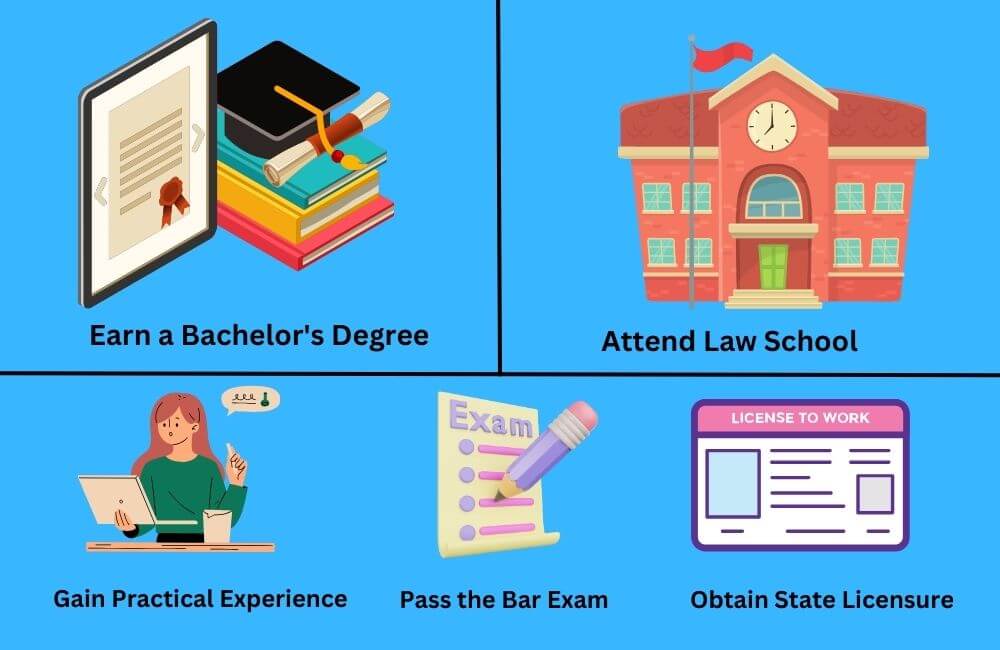Lawyer or attorneys practice in a variety of fields, including family law, commercial law, personal injury, criminal defense, and others.

Mastering How to Become a Family Law Attorney
Hey there! If you’re thinking about diving into the world of law, specifically getting into all the nitty-gritty of family drama, stick around because I’m about to break down how to become a family lawyer.
So, we’ve all heard that saying, right? About how half of all marriages supposedly end up in Splitsville. It’s a bit more complex than just throwing a number out there, but let’s not get tangled in that web. The real tea is that family lawyers are super key in these scenarios.
But hey, it’s not just about the breakups. Family lawyers get into all sorts of family biz – from adoptions to custody battles, they’re in the thick of it.
I’m gonna walk you through what it takes to step into their shoes, the kind of stuff they handle besides the obvious, and even what their bank accounts might look like. Ready to dive into the How to Become a Family Lawyer guide? Let’s get this chat started!
Understanding Family Law
If you want to become a good and experienced family law attorney, then before that you should have an understanding of all the issues involved in family law such as divorce, domestic violence, child custody, adoption, and division of property.
First, you understand all these works of a family law attorney very well, then take this journey of your family forward.
how to become a family lawyer
Here’s a full line for steps to becoming a family lawyer:

- Earn a Bachelor’s Degree
- Attend Law School:
- Gain Practical Experience
- Pass the Bar Exam
- Obtain State Licensure
Step 1. Earn a Bachelor’s Degree:

-
- Begin by completing your undergraduate education. Pursue a bachelor’s degree in a relevant field such as pre-law, political science, or criminal justice. While there is no specific major required, focus on courses that enhance your critical thinking, research, and communication skills.
- Participate in extracurricular activities, internships, or volunteer work related to law or family issues to gain practical experience.
Step 2. Attend Law School:

-
- After earning your bachelor’s degree, apply to law school. Admission to law schools typically requires taking the Law School Admission Test (LSAT).
- During law school, you’ll study various legal subjects, including family law, contracts, torts, and constitutional law. Participate in clinics, moot courts, or legal research projects to gain hands-on experience.
- Consider joining student organizations related to family law to network with professionals and learn about current legal issues.
Step 3. Law School and Juris Doctor (JD) Degree:

-
- Complete your law school program and earn a Juris Doctor (JD) degree.
- The JD program typically takes three years to complete. Focus on family law courses, such as divorce law, child custody, adoption, and domestic violence.
- Participate in internships or externships with law firms, legal aid organizations, or government agencies specializing in family law.
Step 4. Gain Practical Experience:

-
- After law school, seek employment as a law clerk, associate attorney, or legal assistant in a law firm that handles family law cases.
- Practical experience is crucial for understanding the intricacies of family law, interacting with clients, and navigating court procedures.
- Attend family court hearings, mediation sessions, and client meetings to learn firsthand.
Step 5. Pass the Bar Exam:

-
- To practice law, you must pass the bar exam in the state where you intend to practice.
- Prepare thoroughly by taking bar review courses and practicing sample questions.
- Passing the bar exam demonstrates your knowledge of legal principles and qualifies you to practice law.
Step 6. Obtain State Licensure:

-
- Once you pass the bar exam, apply for state licensure with the relevant state bar association.
- Each state has its requirements, which may include character and fitness evaluations.
- Upon receiving your license, you can officially practice as a family lawyer.
Remember that becoming a family lawyer involves dedication, continuous learning, and a commitment to advocating for families during challenging times. Good luck on your legal journey
How long does it take to become a lawyer?
Becoming a lawyer usually takes seven years. To become a lawyer, one must first complete four years of undergraduate studies at a university and then three years of law school. Six to twelve months of on-the-job training while shadowing an established attorney is typically part of the process as well.
It is important to note that the duration may vary depending on the country and the specific requirements of the legal profession in that region.
What Does a Family Lawyer Do?
A family lawyer plays a crucial role in handling legal matters related to familial relationships. Here are the key responsibilities and areas of expertise for family lawyers:
- Divorce and Separation:
- Divorce is one of the most common reasons people consult family law attorneys. These lawyers assist clients in matters related to:
- Marital property division: Ensuring fair distribution of assets and debts during divorce proceedings.
- Alimony or spousal support: Determining financial support for one spouse after divorce.
- Legal documentation: Providing guidance on filing and completing divorce-related paperwork.
- Divorce is one of the most common reasons people consult family law attorneys. These lawyers assist clients in matters related to:
- Child Support, Custody, and Visitation:
- Family lawyers handle child custody and child support cases, which may be part of divorce proceedings or separate legal actions.
- They help parents navigate:
- Child custody arrangements: Determining where the child will live and visitation schedules.
- Child support obligations: Ensuring financial support for the child.
- Paternity cases: Establishing legal fatherhood and child support responsibilities.
- Adoption, Guardianship, and Foster Care:
- Adoption process: Family lawyers guide adoptive parents through the lengthy and complex adoption process.
- Guardianship: Assisting individuals seeking legal guardianship over a minor or incapacitated adult.
- Foster care: Addressing legal issues related to foster care placements.
- Domestic Violence and Restraining Orders:
- Family lawyers represent victims of domestic violence and help obtain restraining orders against abusive partners.
- They provide legal protection and advocate for the safety of family members.
- Prenuptial and Postnuptial Agreements:
- Drafting and reviewing prenuptial agreements (before marriage) and postnuptial agreements (after marriage).
- These agreements address property division, financial rights, and other matters in case of divorce or separation.
- Estate Planning and Family Estates:
- Advising clients on estate planning, including wills, trusts, and inheritance matters.
- Overseeing family estates, ensuring proper distribution of assets, and minimizing tax implications.
- Mediation and Dispute Resolution:
- Family lawyers facilitate mediation sessions to help parties reach amicable solutions without going to court.
- They negotiate on behalf of their clients to resolve family disputes.
- Legal Counsel and Representation:
- Providing legal advice to clients facing family-related challenges.
- Representing clients in court during hearings, trials, and other legal proceedings.
Remember that family law attorneys play a vital role in supporting families during difficult times, advocating for their rights, and ensuring legal protections. If you’re dealing with family-related legal issues, consulting a knowledgeable family lawyer is essential.
Read More – What Does a Family Lawyer Do?
top law schools

Here are the top law schools in the United States based on various rankings:
- Stanford University
- Yale University
- University of Chicago
- University of Pennsylvania (Carey)
- Duke University
- Harvard University
- New York University
- Columbia University
- University of Virginia
conclusion
In conclusion, if you want to become a family law attorney then you must read this post of ours and start your journey. All the information and steps mentioned in this post will help you to fulfill this wish.
From acquiring the necessary education and passing the bar exam to honing communication and empathy skills, the path is clear. Remember, dedication, continuous learning, and helping others handle complex family matters will help make you a successful family law attorney.
So, take the first step, stay committed, and soon you’ll be making a meaningful difference as a trusted family attorney.
FAQ’S
Q1: How long does it take to become a family lawyer?
A1: The path to becoming a family law attorney typically involves completing a bachelor’s degree (4 years), attending law school (3 years), passing the bar exam (varies by state), and gaining practical experience. In total, it can take around 7-8 years.
Q2: Can I specialize in a specific area of family law?
A2: Yes, family law offers various specializations such as divorce, child custody, adoption, and more. Specializing allows you to focus on specific types of cases.
Q3: What is the role of a family lawyer in mediation?
A3: family law attorneys can act as mediators to facilitate communication between parties during negotiations. Their goal is to help both parties reach a mutually acceptable agreement.
Q4: Is courtroom experience necessary for a family lawyer?
A4: While courtroom experience is valuable, not all family law cases go to trial. Many cases are resolved through negotiation and settlement outside of court.
Q5: How do I build a client base as a new family law attorney?
A5: Building a client base requires networking, referrals, and providing excellent service. Offer free consultations and showcase your expertise through seminars or online content.









